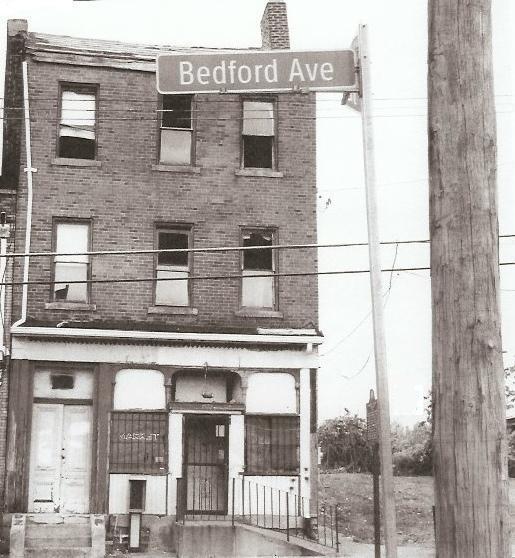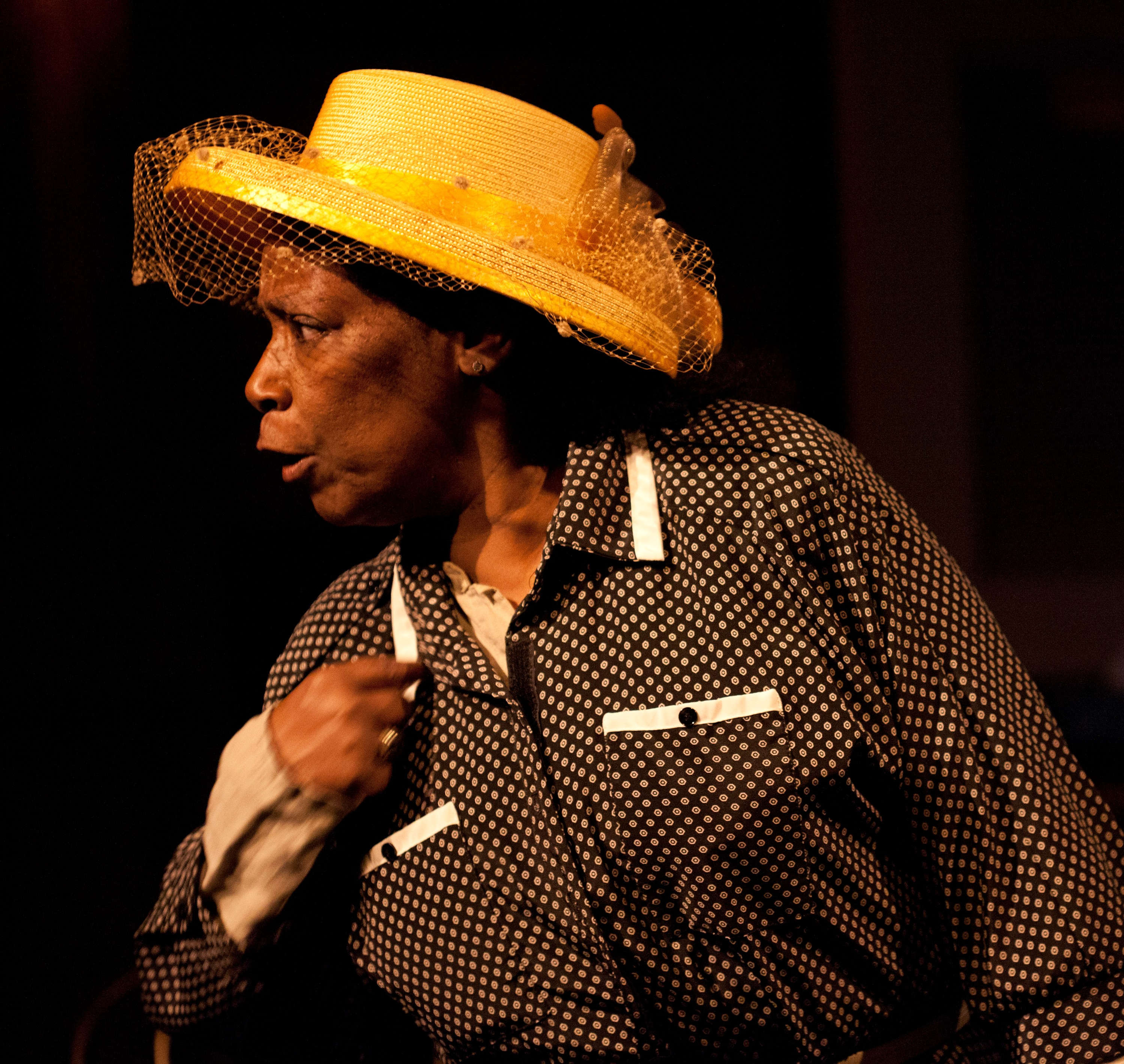August Theater Guide: Don’t Be the Fool
- Like
- Digg
- Del
- Tumblr
- VKontakte
- Buffer
- Love This
- Odnoklassniki
- Meneame
- Blogger
- Amazon
- Yahoo Mail
- Gmail
- AOL
- Newsvine
- HackerNews
- Evernote
- MySpace
- Mail.ru
- Viadeo
- Line
- Comments
- Yummly
- SMS
- Viber
- Telegram
- Subscribe
- Skype
- Facebook Messenger
- Kakao
- LiveJournal
- Yammer
- Edgar
- Fintel
- Mix
- Instapaper
- Copy Link

The glass is more than half full, but of what? Sierra (Siovhan Christensen) contemplates the effects of fracking in “Driftless,” one of several substantial plays on this month’s schedule.
Pity the fool who thinks there isn’t much live theater in August and figures that the few shows presented will all be bubblehead stuff. Mr. T will not whup the fool’s butt, but the fool will miss a lot of good, substantial theater.
Three blockbusters kick off the August schedule: the enjoyable and formidable South Pacific (Pittsburgh CLO); Lope de Vega’s Peribañez, a 500-year-old Spanish blockbuster revived in a modern English adaptation (Quantum Theatre); and August Wilson’s moving, no-it’s-hilarious, no-it’s-terrifying Seven Guitars (Pittsburgh Playwrights).
On other stages at other times: Hatch Arts Collective’s Driftless is a play about fracking. Christopher Durang’s A History of the American Film, a sharp-witted musical send-up of the movies and the country that made them, is being performed by The Summer Company. And Front Porch Theatricals has Floyd Collins, an out-of-the-mainstream musical about a man caught in the glare of the mainstream media.
And there’s more. Previews of all shows can be accessed by scrolling down. They are listed in chronological order, i.e., by their run dates. Pity the fool who comes unstuck in time.
https://www.youtube.com/watch?v=OAZ8yOFFbAc
SOUTH PACIFIC (musical) by Rodgers and Hammerstein, with Joshua Logan. Aug. 5-14, Pittsburgh CLO.
South Pacific is a legendary musical. Opening in New York in 1949, it was one of a string of shows by Richard Rodgers and Oscar Hammerstein II (following Oklahoma! and Carousel) that expanded the horizons of Broadway musical theater. Despite its light-hearted elements, South Pacific explores serious matters in a deadly serious setting: an island used by American combat troops as a staging ground against Japanese forces in World War II. And South Pacific was perhaps the first major musical to deal openly with racism. It features parallel love stories in which two white Americans, a Navy nurse and a Marine officer, fall for residents of the Polynesian island and wrestle with the prospect of bringing nonwhites into their lives. The show’s progressive viewpoint—as expressed in the ironic song “You’ve Got to Be Carefully Taught” (sampled above from the movie version)—set off heated controversies in postwar America. Yet South Pacific was a huge success, winning the Tony Award for Best Musical and the Pulitzer Prize for Drama. It introduced many memorable songs, from the rousing “There Is Nothing Like a Dame” to the haunting “Bali Ha’i” and “Some Enchanted Evening.”
How well do the social messages and the songs hold up today? See Pittsburgh CLO’s revival of South Pacific and find out. The musical was co-written by Joshua Logan and is based on short stories by James Michener; both men served in the Pacific. Benedum Center, 237 7th St., Downtown.

Ethan Saks declaims while Amanda Pulcini smells a fish in “Peribañez.”
PERIBÁÑEZ by Lope de Vega. Aug. 5-28, Quantum Theatre.
What? The man wrote more than a thousand plays and you haven’t seen a single one? Félix Lope de Vega y Carpio (1562-1635) was known in Spain as “monstruo de la naturaleza”: a freak or force of nature. Along with serving two tours in the Spanish navy and engaging in many scandalous love affairs—even after he entered the priesthood at age 51—Lope de Vega turned out prodigious flows of new material for theaters of the time. About 450 of his plays survive, many still considered masterpieces, bristling with energy and deftly mixing humor with serious themes. Lope de Vega’s work is seldom produced in English translation, but last year Pitt’s Department of Theatre Arts did his romantic comedy The Dog in the Manger, and now Quantum Theatre is staging Peribáñez, a tragicomedy in which an army commander schemes to seduce a peasant’s wife. Quantum is performing Peribáñez in a modern adaptation by British playwright Tanya Ronder. The venue is one of Quantum’s favorite outdoor sites, the Jennie King Mellon Rose Garden in Mellon Park, corner of Fifth Avenue and Beechwood Boulevard, Shadyside.

August Wilson’s boyhood home, in disrepair in this undated photo, is now being restored as a community arts center. The backyard staging of “Seven Guitars” will wake echoes of the scene in Wilson’s day.
SEVEN GUITARS by August Wilson. Aug. 5-28, Pittsburgh Playwrights.
Anyone who hasn’t heard about the new production of August Wilson’s Seven Guitars is probably holed up in a bunker awaiting the end of the world, but should you have another excuse, here is the news. Pittsburgh Playwrights Theatre Company is performing the play at the location where Wilson imagined it happening: in the back yard of the playwright’s boyhood home in the Hill District. That certainly makes this production special, but Seven Guitars itself is distinctive for two reasons. It is the most musical of Wilson’s plays and the only one that’s a murder mystery. The hero, a fictional 1940s blues musician named Floyd “Schoolboy” Barton, has been killed just as he was on the verge of making it big. The action unfolds at a post-funeral gathering where those close to him, including his musical sidekicks, are singing and swapping banter and stories both sad and humorous. As they do, episodes from Barton’s life are re-enacted in flashback and questions are raised about the very nature of life, liberty, and the pursuit of happiness. They lead back inevitably to the question: Who killed Schoolboy? At 1727 Bedford Ave., Hill District.
DRIFTLESS by Paul Kruse. Aug. 11-14, Hatch Arts Collective.
Fracking, the controversial method of extracting oil and natural gas, has been the subject of several documentaries and, recently, of fictional drama. The Gus Van Sant/Matt Damon movie Promised Land, filmed mostly in the Pittsburgh area, went into wide release in 2013, and this year we have a home-produced entry. Driftless is a stage play written by Paul Kruse of Hatch Arts Collective and based on research by the company over a period of three years. During that time, Hatch put together two experimental, short performance pieces about fracking, thus combining artistic R&D with subject-matter research. Driftless features a cast of Pittsburgh and Pittsburgh-born actors—Ken Bolden, Trevor Butler, Siovhan Christensen, Alec Silberblatt, Tammy Tsai—with music by slowdanger. The story revolves around a family experiencing the effects of fracking, and Hatch Arts Collective promises “a nuanced look at a complicated issue.” At the New Hazlett Theater, 6 Allegheny Square East, North Side.
WEEKEND COMEDY by Sam Bobrick. Aug. 11-27, South Park Theatre.
Some plays are made for summertime theater, and South Park Theatre’s Weekend Comedy is one. A middle-aged couple rents a cabin in the woods, where the wife has designs of re-igniting her husband’s sexual passion. Then a younger couple shows up—somehow they’ve been booked into the same cabin—and when all decide to share the premises, well, a weekend of comedy breaks loose. The 1985 play is a staple of dinner theater and summer stock companies, maybe because it’s more than a mindless farce. The playwright, Sam Bobrick, has written for such TV shows as “The Smothers Brothers Comedy Hour,” which NBC booted off the air in 1969 after disputes over the show’s stinging social commentary. And Bobrick’s best-known play (co-written with Ron Clark) is Norman, Is That You?, a seriocomic story of a man learning that his son is gay. So you might expect Weekend Comedy to touch on some deeper aspects of sex, love, and gender roles … but mainly it’s meant to be risqué summer fun. Brownsville Road at Wooded Gap Road, South Park Township.

In “Mother Lode,” Linda Haston is both herself and her mother, a feeling that many have had.
MOTHER LODE by Virginia Wall Gruenert. Aug. 12-14, off the WALL productions.
For the third and perhaps last time this year, off the WALL productions is presenting a short run of a one-woman play that generated considerable word-of-mouth buzz in its previous performances. Mother Lode, a drama with comedy, depicts how mother-daughter relationships may be tested—and deepened—at a crucial time: when the elderly mother is near life’s end. Linda Haston plays both roles, the daughter dealing with a veritable “mother lode” of feelings and the mother slipping into dementia. Written by Virginia Wall Gruenert, Mother Lode is drawn from Haston’s real-life experiences. At Carnegie Stage, 25 W. Main St., Carnegie.
THIS IS WHY WE CAN’T HAVE NICE THINGS (one-person sketch comedy) by Heidi Nagle. Aug. 18-20, presented by the creator.
The Entertainment Central award for Best Title of an Original Theater Piece goes to This Is Why We Can’t Have Nice Things. It is a statement that everyone has heard and some people are quite familiar with, from hearing it uttered in their direction more than once. Yet it makes you eager to find out what the Why(s) could be, since the complaint couldn’t possibly be about your own careless habits or the dog that is your dog because you were the one who wanted it. This Is Why We Can’t Have Nice Things is an evening of one-woman sketch comedy by Heidi Nagle, the resident stage manager at off the WALL productions and also founder and co-artistic director of the comedy troupe The Harvey Wallbangers. Nagle has billed her one-woman show as “an abstract exploration into the human psyche,” but one suspects that some parts may be specific and physical. At Carnegie Stage, 25 W. Main St., Carnegie.
THE CEMETERY CLUB by Ivan Menchell. Aug. 18-27, Apple Hill Playhouse.
Many locals remember The Cemetery Club as a 1993 movie filmed in Pittsburgh. However the movie was based on a stage play, and Apple Hill Playhouse is presenting this comic drama in its original form. The story in a nutshell: Three recently widowed women, all of advanced age, strike up an informal “club” around visits to their late husbands’ graves. Comedy and pathos ensue when it turns out the women have quite different approaches to widowhood. One is devoted to the memory of her dearly departed, another to snagging a new man—and the third, while hardly trying, actually snags one. The Cemetery Club is by playwright Ivan Menchell, whose name may ring a bell with some younger fans. He wrote the book for Death Note: The Musical, an adaptation of the spooky manga-and-anime series. That show premiered last year in Japan. The Cemetery Club trades on New York-style Jewish humor, not supernatural Japanese suspense, but theater audiences over the decades have found it both amusing and endearing. 275 Manor Rd., Delmont.
A HISTORY OF THE AMERICAN FILM (musical) by Christopher Durang and Mel Marvin. Aug. 18-28, The Summer Company.
After years of working at the intellectually lunatic fringes of the theater scene, Christopher Durang is finally certified as a major playwright. His Vanya and Sonia and Masha and Spike, a comical take-off on Chekhov, won the 2013 Tony Award for Best Play. Now it’s time to catch up with previous Durangments. His plays have been silly/wicked satires on subjects from religion (Sister Mary Ignatius Explains It All for You) to U.S. foreign policy (The Vietnamization of New Jersey), and Pittsburgh’s The Summer Company is staging one that ranks very high on the Durang scale: A History of the American Film. The title makes it sound like a ponderous college course, but it’s a 1978 Broadway musical co-written by Durang with Mel Marvin. In rapid-fire sketches, the actors portray parodies of stock characters and scenes in American movies from the 1920s to the ‘70s. Citizen Kane has its sacred-cow credentials examined, and due treatment is given to war movies, detective movies, and more. A History of the American Film is a double-barreled lampoon that pokes fun at Hollywood while showing how its films reflect the course of our society over the years. Plus, there’s music. In the Genesius Theater on the Duquesne University campus, Seitz Street at Locust Street, Uptown.

As The Second City demonstrates, in politics, everybody’s got a hand out.
THE SECOND CITY in FREE SPEECH (WHILE SUPPLIES LAST) (sketch comedy). Aug. 26-27, presented by Pittsburgh Public Theater.
Have you been enjoying Stephen Colbert’s TV spoofs of our wild and crazy election season? More of that kind of stuff is being made available live on stage. Colbert is an alumnus of The Second City, the Chicago-based company in which many famous comics and actors (Tina Fey, Bill Murray, etc.) had their start, and now The Second City’s current touring ensemble is performing a feature-length exercise in political comedy. Free Speech (While Supplies Last) does not consist entirely of material related to this year’s election cycle. It includes vintage Second City political sketches, which may feel like comic relief to those weary of what’s going on this year. But if Donald and Hillary come up during the course of the evening, well, that’s show business. Presented by Pittsburgh Public Theater at the O’Reilly Theater, 621 Penn Ave., Cultural District.
FLOYD COLLINS (musical) by Adam Guettel and Tina Landau. Aug. 26-28, Front Porch Theatricals.
Front Porch Theatricals is at it again, doing another offbeat musical that’s a cult classic though not a household-name hit. The show is Floyd Collins, a name that once was actually known in households everywhere. The real-life Floyd Collins was a cave explorer in Kentucky during the early 1900s. In 1925, in what is now Mammoth Cave National Park, Collins became trapped in a tight underground passage, oh-so-close to the open air but not quite. Rescue efforts lasted two weeks. They drew throngs of reporters and created a national media sensation, with millions of people snapping up newspapers and tuning in newly bought home radios to follow the drama. Collins died before his buddies could free him, but for a brief while he was a folk hero—a symbol of courage, of compassion, of celebrity itself. The 1996 musical, by Adam Guettel and Tina Landau, premiered off-Broadway and ran briefly despite winning rave reviews along with Obie and Lucille Lortel Awards. Floyd Collins may not be Hamilton, but it’s here and the tickets don’t cost a fortune. In the New Hazlett, 6 Allegheny Square East, North Side.
THE 39 STEPS (comic adaptation) by Patrick Barlow. Through Sept. 11, Pittsburgh CLO Cabaret.
The 39 Steps, Alfred Hitchcock’s black-and-white thriller about a man pursued by sinister spies, has been remade several times but for many years hadn’t been properly parodied. In 2005 the English comedian and playwright Patrick Barlow took care of that. His madcap play won an Olivier Award (the British equivalent of a Tony) for Best New Comedy. It has become an audience favorite on Broadway, off-Broadway, and in cities from Shanghai to Montevideo. Barlow’s send-up of The 39 Steps is officially titled John Buchan’s The 39 Steps, after the author of the novel that Hitchcock adapted for the screen (got that?). Since the play uses only four actors for 150 roles, there’s a lot of high-speed shuffling, which helps build a comic energy that parrots the suspenseful energy of the movie. The small cast of Barlow’s John Buchan’s The 39 Steps also makes it a natural for cabaret theater, so naturally the Pittsburgh production is being done by CLO Cabaret. In the Cabaret at Theater Square, 655 Penn Ave., Cultural District.
Photo credits: Driftless, by Paul Kruse; Peribañez, by John Altdorfer; August Wilson home, by Wikimedia user HeyYallYo; Mother Lode, courtesy of Linda Haston and off the WALL; and The Second City, courtesy of the company.
Mike Vargo, a Pittsburgh-based freelance writer and editor, covers theater for Entertainment Central.
Share on Social Media
- Like
- Digg
- Del
- Tumblr
- VKontakte
- Buffer
- Love This
- Odnoklassniki
- Meneame
- Blogger
- Amazon
- Yahoo Mail
- Gmail
- AOL
- Newsvine
- HackerNews
- Evernote
- MySpace
- Mail.ru
- Viadeo
- Line
- Comments
- Yummly
- SMS
- Viber
- Telegram
- Subscribe
- Skype
- Facebook Messenger
- Kakao
- LiveJournal
- Yammer
- Edgar
- Fintel
- Mix
- Instapaper
- Copy Link
Follow Entertainment Central
Sign up for the EC Newsletter
Latest Stories







